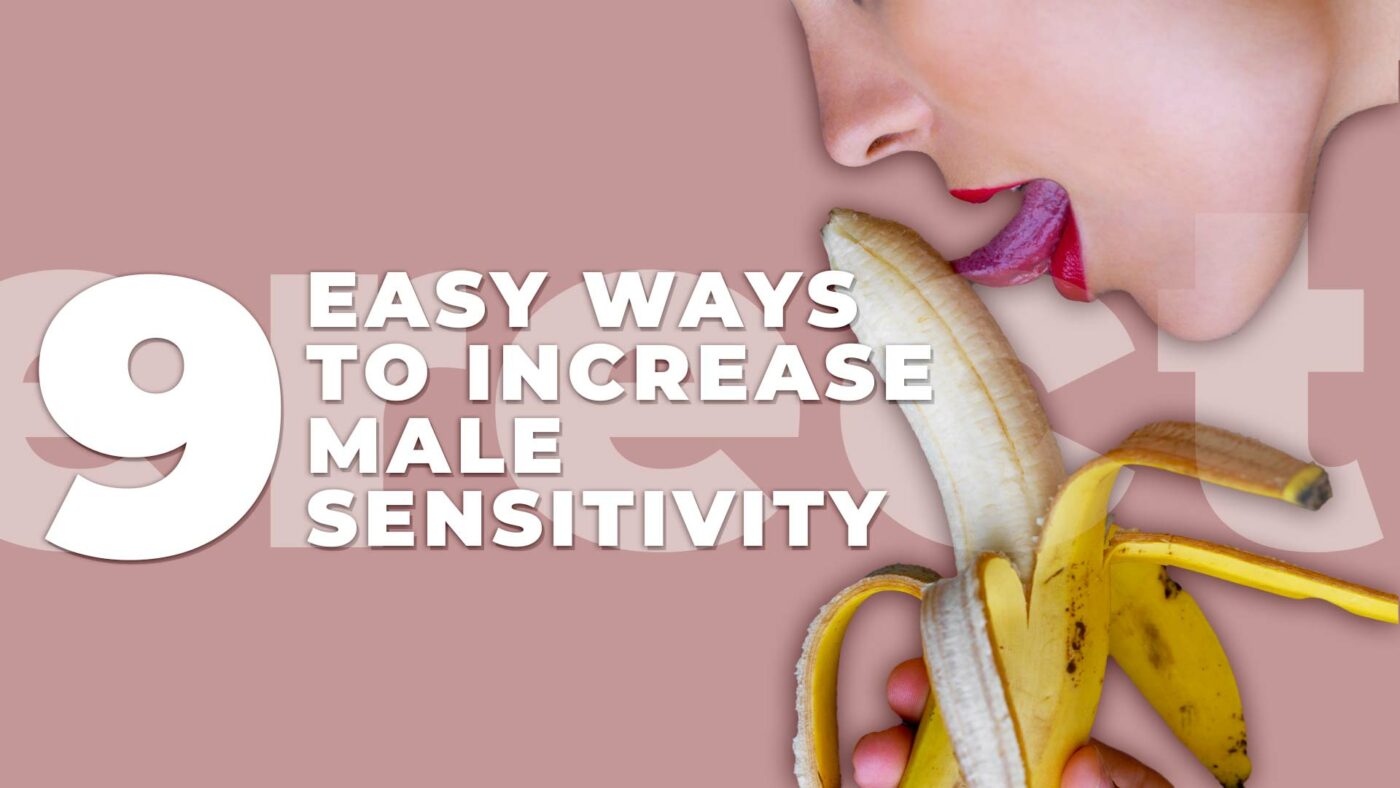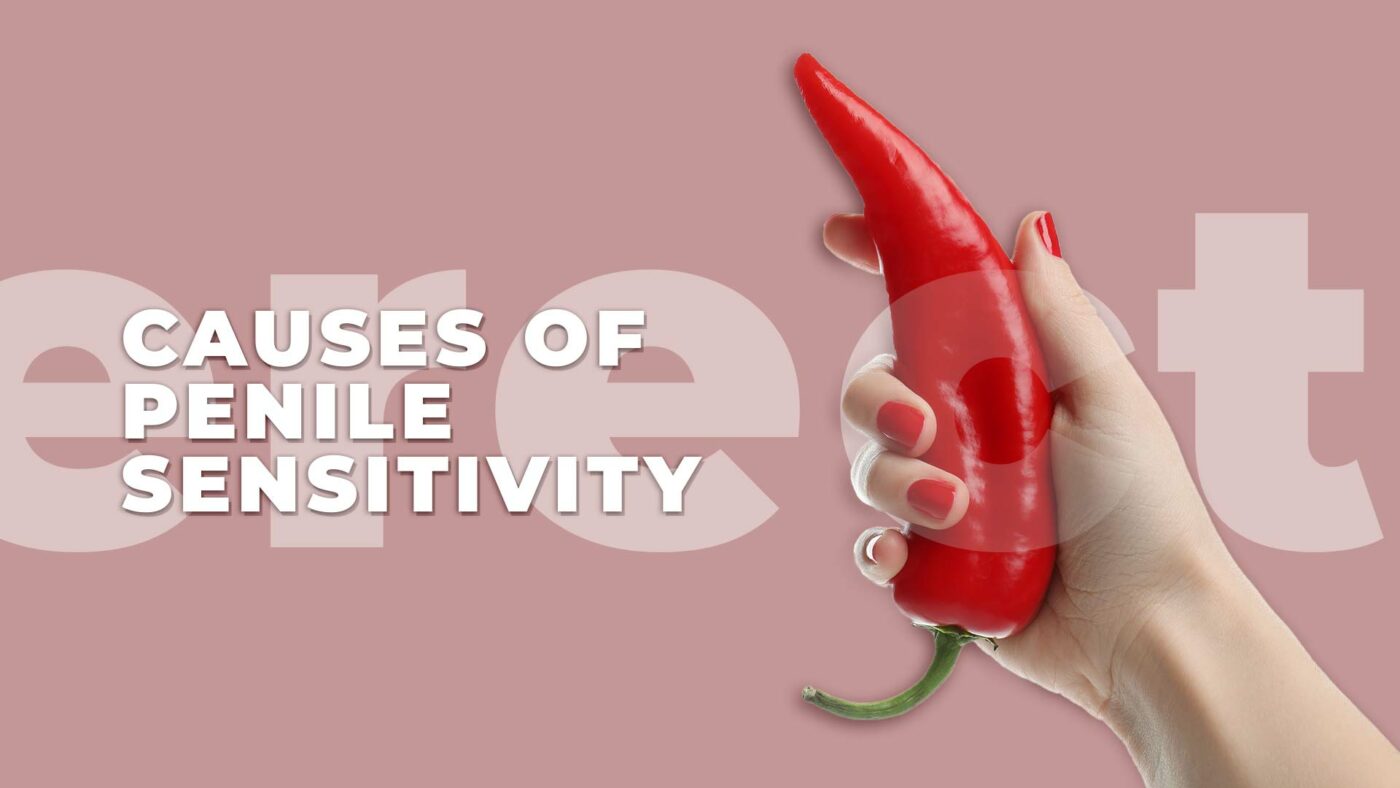9 Easy Ways to Increase Male Sensitivity

When things are getting spicy in bed, it becomes essential that both partners come out satisfied after a sexual session. However, this may not be the case if a man does not feel the sensations on his penis. A decrease in penile sensitivity, also known as a “numb penis,” can deteriorate your sex life. A person wouldn’t even feel the slightest touch on his penis, and he wouldn’t be able to enjoy having intercourse with his partner.
There could be many reasons why your penis has gone numb – you have been sitting in a particular position for a long time, your testosterone levels are low, hormonal disturbances, etc. Unfortunately, it can be an embarrassing issue to discuss, which often prevents men from seeking help.
Fortunately, loss of penis sensitivity is a treatable condition, and lifestyle changes can often provide relief. In the following sections, we will explain what loss of penile sensitivity is and the factors that contribute to this common sexual health issue.
Table of Contents
What is Penis Numbness?
Penile numbness, or penis insensitivity, refers to a condition where there is a reduction or loss of sensation in the penis. The symptoms of penile numbness may include:
- Decreased sensation in the penis or the surrounding areas, such as the scrotum, testicles, or perineum (the area between the anus and the scrotum)
- A tingling sensation or “pins and needles” feeling in or around the penis
- A sensation of coldness or burning in or around the penis
- Bluish or purplish skin discoloration on or around the penis
If you are experiencing any of these symptoms, it is recommended that you consult with a healthcare provider.
Causes of Penile Sensitivity

The causes of penile numbness or decreased penis sensitivity range from mundane to serious. Your doctor can help determine the root cause of the problem and help you regain sensitivity.
Injury and Discomfort to the Penis
If you take frequent or long bike rides, you may damage your penile nerves, which can result in decreased penis sensitivity. The seats of the bicycle compress the nerve endings and the blood vessels that supply the penis. This is why a whopping 50-80% of cyclists report a loss of sensation in the penis.
If you wear tight trousers or sit uncomfortably for a long time, chances are that your penis can go numb. These things put a strain on the penile nerves and the blood vessels in the penis or perineum.
An injury to the penis caused during a car or bike accident or even during surgery can also lead to a loss of sensation in the penis.
2. Low Testosterone Levels
The male sex hormone testosterone, which is produced in the testicles, influences a man’s sex drive, appearance, and energy levels. For healthy sexual functioning, testosterone levels should be within the appropriate range. Low T levels can decrease your libido and make your penis less sensitive to stimulation. Testosterone levels decrease as you age. While low testosterone levels are considered a part of aging, they can affect your sex life, for which you should consider seeing a medical professional.
3. Side-effects of Certain Medications
Certain medications, such as antidepressants, affect the functioning of the brain and work on brain chemicals called neurotransmitters. Neurotransmitters play an important role in sexual arousal, and an imbalance can affect sex drive and arousal. Drugs such as selegiline (that are used to treat Parkinson’s disease) can affect dopamine levels and result in penile numbness.
Medications used for the treatment of erectile dysfunction (ED), such as Viagra, Cialis, and Levitra, can decrease penile sensitivity. However, this may be helpful for men suffering from premature ejaculation (PE). Premature ejaculation is a condition that makes a man ejaculate sooner than he or his partner wants him to. These PDE 5 inhibitors and other drugs, such as Poxet 60 mg, Dapoxetine, etc., can also help with PE.
4. Mental Health-related Issues
Certain psychological issues and mood disorders, such as depression, anxiety, bipolar disorder, etc., can affect your sexual health and decrease your sexual desire orgasms, and reduce the sensations produced in the penis. However, if you’re seeking treatment for these disorders, antidepressants used for treating these issues (as discussed above) can also hurt your sex life. This often leads to performance anxiety, which makes the person ejaculate sooner than expected.
5. Partial Erections
While the penis is much more sensitive when it is fully erect, penile sensitivity can also occur if you struggle to get hard. Partial erections can also indicate an underlying sexual disorder such as erectile dysfunction (ED).
6. Death Grip Syndrome
The way you masturbate can also affect your sensitivity. If you masturbate using a very tight grip, you can become desensitized to other types of pleasure and experience a loss of sensation in the penis.
How Can You Increase Penile Sensitivity?

Once you have identified the exact cause of decreased penile sensitivity, you can begin working on different options to increase penis sensitivity. If a medical condition is causing the problem, look for potential treatment options after consulting a doctor. If the cause of reduced penis sensitivity is an injury, it will heal with the injury itself. Meanwhile, here are certain things you can do to increase penis sensitivity.
Increase Testosterone Levels
If your testosterone (T) level drops, you might feel less responsive to sexual stimulation and have trouble getting aroused. Symptoms such as erectile dysfunction, low libido, hair loss, lower sexual pleasure, and reduced penis sensitivity can be due to low testosterone levels. Here’s what you can do to increase your testosterone levels.
Weight training and high-intensity training exercises have been known to increase testosterone levels in older men. Furthermore, a diet of proteins, healthy carbohydrates, and fats can also improve your T levels. If you drink alcohol or smoke, you should consider giving them a break, as they are known to deteriorate the production of testosterone.
If you require testosterone replacement therapy (TRT) (that comes in the form of pills and injections), seek help from a doctor. Testosterone therapy is available in 5 different ways:
- Transdermal – skin patch, gels, creams, lotions
- Injections that are injected under the skin or into the muscle
- An oral patch that is placed in the mouth
- Pellets that are implanted into the fatty tissue under the skin
- Medicine that is pumped into each nostril (3 times a day)
There’s no single treatment that fits all. Consult your doctor for the appropriate form of treatment.
Lifestyle Changes
Sitting in an uncomfortable position for prolonged periods can cause decreased penile sensitivity. Consider taking short breaks and standing whenever possible. You can also change your sitting position and make yourself feel comfortable.
If you’re a cyclist, consider changing your bicycle seat to one that is more comfortable and does not cause pain or discomfort.
Last but not least, wear loose-fitting trousers and underwear so that there is adequate blood flow in the body—especially to your penis.
Change Your Masturbating Technique
If you have been stroking too hard for a while now, consider switching your masturbating technique. Loosen your grip, apply some lube, and stroke slowly. This can help recondition your penile sensation.
De-stress Yourself
If you have been dealing with certain mental health conditions such as anxiety, depression, etc., it can be challenging to improve penis sensitivity. However, it isn’t impossible. While medications can undoubtedly deteriorate your sexual drive, you should indulge yourself in activities such as mindfulness and deep-breathing exercises such as meditation to help alleviate stress.
Consider taking a hot bath or shower to help your mind and muscles relax. Warm water improves circulation and makes the penis more responsive to touch.
If you have difficulty coping with stress, consider seeking help from a therapist.
Medications
If you suffer from long-term medical conditions such as diabetes, multiple sclerosis (MS), and Peyronie’s, your doctor may prescribe a medication to treat it. Your doctor may consider changing your medication if you experience reduced sensitivity as a result of the side effects of a particular drug.
Less Lube
While lube can be helpful, too much can decrease sensitivity. Try reducing your lube or going without it to create more friction. This may allow for a more responsive and sensitive experience that could make it easier to reach orgasm.
Change Your Position
Changing your sex position can also increase friction and make sex more exciting. Different positions cause your partner’s body to move in new ways, which can create more sensation in your genitals and increase sensitivity. You can try having your partner put their legs together, lie on their stomach, or experiment with entirely new positions to boost sexual satisfaction.
Adjust Your Sitting Position
It’s also important to pay attention to how you sit. Sitting incorrectly or in the wrong places can compress the pudendal nerve, which transmits sensations from your genitals to your brain. If you experience pain in your lower abdomen when sitting, try adjusting your position to place more pressure on your buttocks and less pressure on your perineum. Simple adjustments like taking breaks to stand up and stretch can also help alleviate pressure and prevent nerve pain.
Communicate with Your Partner
To have a healthy and satisfying sexual relationship, it is essential to communicate with your partner about their needs and desires. Taking the time to ask what your partner needs can make a big difference in the quality of your sexual experiences together.
Perhaps your partner needs some time to relax before moving on to sexual activity, or maybe they prefer more foreplay that focuses on other areas of their body to help get them in the mood. Alternatively, they may want to stop altogether. It’s important not to be afraid to ask and have an open and honest conversation with your partner about what they need to have a fulfilling and enjoyable sexual experience.
What if You Have a Hypersensitive Penis?
Men who have a sensitive penis may find it difficult to last long during sexual activity, and this may result in premature ejaculation (PE). According to the International Society of Sexual Medicine (ISSM), PE is characterized by the following:
- Ejaculation that consistently occurs within approximately one minute of vaginal penetration
- The inability to delay ejaculation during almost all or every vaginal penetration
- Negative psychosocial outcomes such as getting upset, frustrated, or avoiding sexual intimacy
It is worth noting that these definitions are defined in terms of vaginal penetration. However, premature ejaculation can occur in any form of sexual activity that stimulates the penis.
Over-the-counter sprays, creams, and wipes containing topical anesthetics like lidocaine or benzocaine may be used to decrease sensitivity. There are also “climax control” condoms that reduce penile sensation through a coating of a topical anesthetic or by using thicker-than-normal latex.
While it may not be the easiest conversation to have, seeking medical advice on reduced penile sensitivity or other concerns about your sexual health is recommended.
The Bottom Line

If you have a numb penis, things may not be going the way you planned them to. However, to rediscover your penis sensitivity, it’s important to figure out the exact cause of the problem. A bike or car accident, vigorous sex, penis injury or excessive masturbation, low T-levels, and side effects of medications are some of the common causes of penile sensitivity. Take help from a doctor who can help you discover the underlying reasons for the problem. Consider making certain lifestyle modifications and try different treatments unless you find the one that actually works for you.
References
- American Urology Association (AUA) Urology Care Foundation. (n.d.). Low Testosterone: Symptoms, Diagnosis & Treatment. Retrieved July 23, 2020 from https://www.urologyhealth.org/urology-a-z/l/low-testosterone
- Baran, C., Mitchell, G., & Hellstrom, W. (2014). Cycling-Related Sexual Dysfunction in Men and Women: A Review. Sexual Medicine Reviews, 2(3-4), 93-101. doi: 10.1002/smrj.32. Retrieved from https://linkinghub.elsevier.com/retrieve/pii/S2050052115300895
- Baradaran, N., Awad, M., Gaither, T., Fergus, K., Ndoye, M., & Cedars, B., et al. (2018). The association of bicycle-related genital numbness and Sexual Health Inventory for Men (SHIM) score: results from a large, multinational, cross-sectional study. BJU International, 124(2), 336-341. doi: 10.1111/bju.14396. Retrieved from https://bjui-journals.onlinelibrary.wiley.com/doi/10.1111/bju.14396
- Bleustein, C., Arezzo, J., Eckholdt, H. et al. (2002). The neuropathy of erectile dysfunction. International Journal of Impotence Research 14, 433–439. doi: 10.1038/sj.ijir.3900907. Retrieved from https://www.nature.com/articles/3900907
- Centers for Disease Control and Prevention (CDC). (2009). NIOSH Publications and Products – No-nose Saddles for Preventing Genital Numbness and Sexual Dysfunction from Occupational Bicycling. Retrieved on July 23, 2020 from https://www.cdc.gov/niosh/docs/wp-solutions/2009-131/default.html
- Guo, L., Liu, Y., Wang, X. et al. (2017). Significance of penile hypersensitivity in premature ejaculation. Scientific Reports 7, 10441. doi: 10.1038/s41598-017-09155-8. Retrieved from https://www.nature.com/articles/s41598-017-09155-8
- Rowland, D. (1998). Penile sensitivity in men: a composite of recent findings. Urology, 52(6), 1101-1105. doi: 10.1016/s0090-4295(98)00413-0. Retrieved from https://linkinghub.elsevier.com/retrieve/pii/S0090429598004130
- Sharp, H. J., Swanson, D. A., Patel, H., Gorbatiy, V., Frenzel, J. C., & Frank, S. J. (2011). Subacute penile numbness after brachytherapy for prostate cancer. Brachytherapy, 10(1), 64–67. doi: 10.1016/j.brachy.2010.02.197. Retrieved from https://linkinghub.elsevier.com/retrieve/pii/S1538472110002461
- U.S. Food and Drug Administration (FDA). (2008). Eldepryl (selegiline hydrochloride) capsules. Retrieved on July 23, 2020 from https://www.accessdata.fda.gov/drugsatfda_docs/label/2008/020647s006s007lbl.pdf
- Wang, W., Minhas, S., & Ralph, D. (2006). Phosphodiesterase 5 inhibitors in the treatment of premature ejaculation. International Journal Of Andrology, 29(5), 503-509. doi: 10.1111/j.1365-2605.2006.00689.x. Retrieved from https://pubmed.ncbi.nlm.nih.gov/16573707/
Disclaimer
HisBlue is not a substitute for professional medical care or advice from your doctor. The health information on the HisBlue website is general and provided for your information only. We have ensured our content is accurate and current, with reviews by expert doctors. However, we cannot guarantee its accuracy or timeliness. This information is not meant to replace the diagnosis, treatment, or judgement of your doctor or another qualified healthcare provider.
Disclaimer
HisBlue is not a substitute for professional medical care or advice from your doctor. The health information on the HisBlue website is general and provided for your information only. We have ensured our content is accurate and current, with reviews by expert doctors. However, we cannot guarantee its accuracy or timeliness. This information is not meant to replace the diagnosis, treatment, or judgement of your doctor or another qualified healthcare provider.


